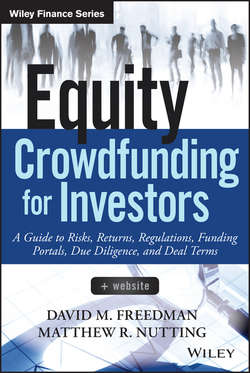Читать книгу Equity Crowdfunding for Investors - Matthew R. Nutting - Страница 7
На сайте Литреса книга снята с продажи.
Preface: The New Angel Investors
The Old Rules
ОглавлениеBefore the legalization of equity crowdfunding, for the vast majority of Americans, investing in fast-growing startups was either highly impractical or illegal.
Based on legislation enacted in 1933 – as long as most of us can remember – angel investing was largely closed to all but (1) the wealthiest people in America and (2) founders of private companies2 seeking capital and their family and friends, known as the “three Fs.” The legal basis for those restrictions began with the Securities Act of 1933 and was further shaped by the Securities and Exchange Commission (SEC) and federal courts. In Chapter 2 we will explain just enough of that regulatory framework to help you understand the new equity crowdfunding rules, but here is the nutshell version:
• Issuers of private company stock, whether in startups or existing businesses, could offer shares to an unlimited number of “accredited investors,” which includes individuals with a net worth of at least $1 million or annual income of $200,000 ($300,000 for married couples). Those issuers could also sell shares to as many as 35 nonaccredited investors per round of financing, as long as those nonaccredited investors were smart enough to understand the risks of buying private securities and had a personal relationship with the founders or their close advisers.
• Private issuers and their registered intermediaries (broker-dealers, for example) could offer shares only to people with whom they had “substantial” prior relationships, with a few exceptions. They could not engage in “general solicitation,” which means they could not advertise an investment offering to the general public.
For Americans who did not have such wealth or relationships with issuers (or their intermediaries), the door to angel investment was locked tight and the curtains were drawn. The doors to other kinds of private securities, too, were barred (and still are) for most average Americans, including venture capital, private equity, hedge funds, and other “alternative” investments. So don't blame yourself for not being remotely aware that Apple shares were available for purchase in 1977 or that Facebook was looking for early investors in 2005, when they were startups.3
2
Private company securities are those not registered with the Securities and Exchange Commission and not listed on a public stock exchange.
3
We don't mean to imply that if you had known about Apple's and Facebook's early investment opportunities then, you would have been able to invest in them. At that stage, the companies wanted only strategic investors, i.e., people who had expertise to help the companies develop, market, and distribute their products, populate their boards of directors, and attract future rounds of venture capital.
